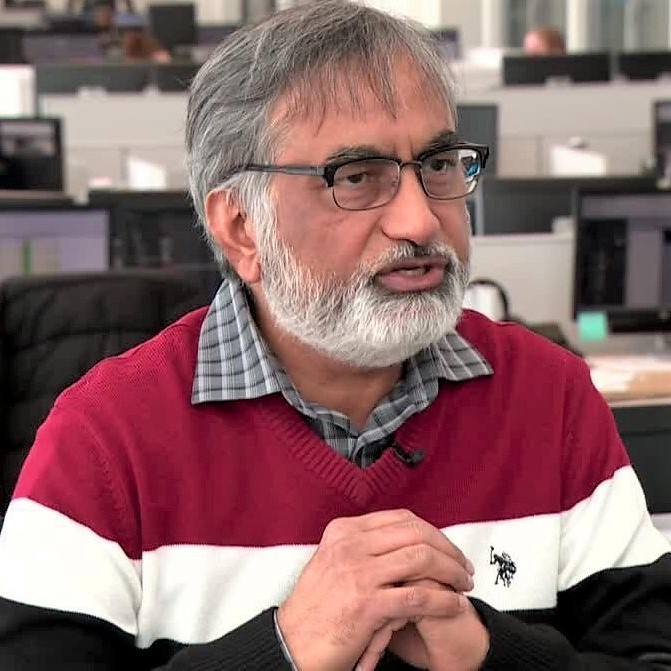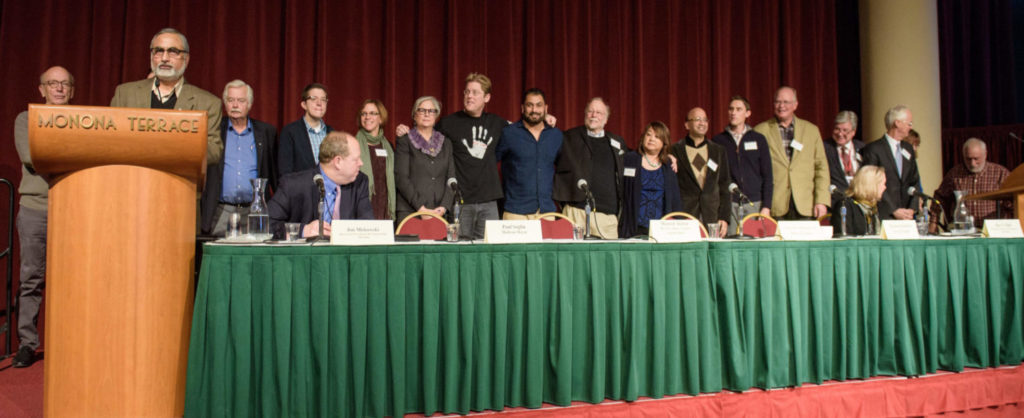
Madison-based “We Are Many: United Against Hate” – a non-partisan, non-profit, state-wide organization made up of common people who seek equal protection for all and are united against hate, bigotry and racism – has grown quite a bit in a very short period of time throughout the state of Wisconsin and beyond. This past week, they officially launched their non-partisan policy agenda.
“We Are Many: United Against Hate” has been wrestling with various policy ideas for combating hate for a couple of years now. Their recently announced agenda would consist of four policies: creating greater economic security, honoring America’s heritage as a nation of immigrants, promoting religious tolerance and celebrating ethnic, cultural religious-identity differences.
“What we’re asking people to give for these four non-partisan areas is to help us organize events in their areas across the state and doing it in a bipartisan way,” “We Are Many: United Against Hate” founder Masood Akhtar tells Madison365. “Choose the topic and then we invite our community and we invite our local officials of both parties and we talk about the issues and come up with an action plan.
“We have to do it in a non-partisan way so that we can solve some of these problems,” he adds.
They kicked off their effort last week on Neil Heinen’s “For The Record” on Channel 3000 where Heinen interviewed various advisory board members of the Madison-based United Against Hate.
“In all of the previous interviews, we heavily focused on educational policies of hard to get the word out,” Akhtar says. “We’ve been working very closely with high schools and now have expanded to university campuses talking and engaging students. Finally, we started looking at the root causes of hate and what were the best models and how we should incorporate those recommendations to overcome that hate.”
The United Against Hate Policy Committee Chair is A.J. (Nino) Amato. Board members are numerous and include gubernatorial candidate Mike McCabe, civil rights activist Gaddi Ben Dan, Dane County District Attorney Ismael Ozanne, Charles Cohen, E. Gordon Fox Professor Emeritus at UW, John W. Vaudreuil, the former United States Attorney for the Western District of Wisconsin, and former Wisconsin State Senator Dale Schultz.
“They all agreed to work on this in a non-partisan way,” Akhtar says. “They are all coming together to do this. It’s just unbelievable how these people are coming together with different backgrounds to really press this issue.”
Akhtar says that was very important to have Schultz, a longtime Republican, in the group.
“When I talked with Dale [about joining], he agreed in one minute,” Akhtar remembers. “He said, ‘My schedule is very busy, but this thing that you are doing is very important and very critical.’ It is great to have him. This is something that Republicans and Democrats have to come together on to address some of these issues.”
Schultz, for his part, told Neil Heinen in the video above launching the agenda, “What I would invite people to do is to google ‘Ronald Reagan’s farewell speech’ to find out what real conservatism is about … talking about that shining city on a hill, talking about a welcoming nature towards immigrants, about immigrations making us stronger.
“That, to me, is what America has got to get back to,” he added. “I don’t know how we got to this situation where it’s all about how much fear and hate you can stoke.”
With policy point number one, Akhtar says that “We Are Many: United Against Hate” realized right away that economic insecurity is a fertile breeding ground for hate and that they needed to take action steps beyond words.
“Politicians like to talk about this low unemployment rate but when you look at all of the data and surveys they found out that 40 percent of the population is really struggling nationwide. They can’t pay their bills,” says Akhtar, who earlier this year received a prestigious National 2018 Director’s Community Leadership Award from FBI Director Christopher Wray for his work. “This whole economic insecurity is really becoming a breeding ground for hate. So we’ve launched Empowering Students for Success.”
Empowering Students for Success is a new program that offers 0% interest financing and much more to students from low-and medium-income families to help them pursue higher education, regardless of their ethnicity or color or religion or political affiliation.
“Our plan is very unique in that the loan is completely interest-free and it’s tied to jobs,” Akhtar says. “When you get a job, then you pay it back.”

The payback schedule is flexible and the repayment of loan will be tied to wages students would earn after graduation. So, the payment schedule will not be one-size-fits-all, giving more breathing room to the young person.
Akhtar says that they plan to recruit mentors from different disciplines and ethnicities who will provide mentoring to these students to increase the graduation rate and help build an inclusive community.
“I’m putting together a list of different actors who will have different fields of specialization but also will be diverse,” he says. “The reason for that is that you are a white, regular guy looking for a $25,000 loan and you are looking to become a mechanical engineer you are going to get a mentor who is a mechanical engineer, but he’s not going to be the same color as you. We want to build diversity.”
The other thing that is unique is the loan forgiveness.
“If the students secure an aggregate GPA of 3.91 out of 4.0, then your loan is forgiven,” Akhtar says. “The only thing we ask you to do is to become a mentor for others.”
With the four non-partisan policy issues and the new loan program officially launched, Akhtar says the focus is now on getting the word out to the community.
“We really need community help with this. That’s so important,” he says. “We’re hoping people will connect with us and say, ‘Look, we’re interested in this particular policy area, can you come and work with us?’ They can help plan and organize an event and invite elected officials from both parties and the community. Together, we can build an action plan.
“What’s going to happen is that one-size-fits-all is not going to work because diverse communities are going to be different,” Akhtar says. “Their issues and challenges related to hate are going to be very different. So we’re going to organize these events based upon their area and that’s where we really need help.”



